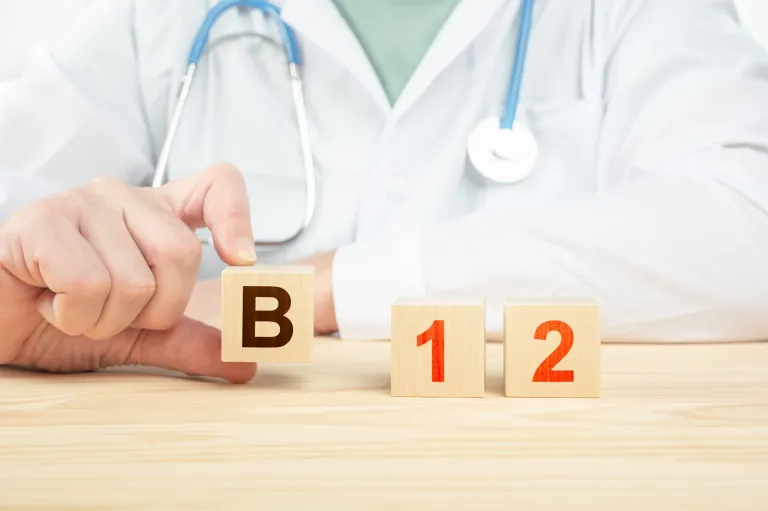|
By Cassie I. Story, RDN
What is vitamin B12? Vitamin B12 is a water-soluble vitamin that plays an important role in neurological and hematological functions.1 The majority of bodily cells require vitamin B12, especially ones that undergo rapid turnover like red blood cells (RBC).2 Vitamin B12 is also involved in DNA synthesis and methylation of RNA, as well as Phase I detoxification.1,3 Perhaps one of its most important roles is in relationship to the nervous system and its need for the formation of the myelin sheath, which is found around nerve cells.2 In fact, long-term vitamin B12 deficiency-induced neuropathy can damage nerve cells to the point of irreversible neurologic damage.2 What food sources are rich in vitamin B12?Foods rich in vitamin B12 are primarily from animal sources including liver, oysters, poultry, fish, eggs.2 Some fermented foods like miso and tempeh also contain vitamin B12. However, plant sources of vitamin B12 are likely unavailable for absorption by humans—so special care should be taken by people who avoid or do not consume animal products.2 Absorption considerations In order for food-based vitamin B12 to be absorbed, it must first interact with hydrochloric acid (HCl) and gastric protease in the stomach. These substrates allow vitamin B12 to be released from the protein it is bound to and then to be combined with intrinsic factor (IF), which is secreted by the parietal cells in the stomach. The combined vitamin B12-IF complex travels through the gastrointestinal (GI) tract for absorption in the distal ileum. It is well-established that HCl and IF production decline with age, and certain medications (proton pump inhibitors, metformin) have been found to reduce vitamin B12 absorption in the gut.2,4 Supplementation with vitamin B12 in its free form, or combined with IF, may be more beneficial in preventing or treating a deficiency.2 Bodily storage As vitamin B12 is stored in the liver in high amounts, with estimates being 3-5 milligrams, the majority of individuals are not at high risk for a deficiency.2 Situations in which individuals have difficulty absorbing vitamin B12, such as malabsorptive disorders, lack or decline in the production of HCl or IF, low levels of hepatic storage, or dietary insufficiency, particularly for those who follow a strict vegan diet, are at higher risk of deficiency.1 Typically, there are three causes for a potential vitamin B12 deficiency. These include:1
What happens with a vitamin B12 deficiency? Nutritional deficiency is the main cause for low hemoglobin and red blood cells (RBCs).2 A reduction of hemoglobin in the blood can eventually lead to anemia, a condition that can affect day-to-day living by impacting energy levels.2 Macrocytic anemia can result from low levels of vitamin B12 and presents with typical signs of anemia like pallor and fatigue.1 Jaundice can also be present as a result of impaired RBC formation.1 Certain medications can negatively impact vitamin B12 status, including contraceptive pills. Oral contraception can impact B12 status, without typically producing the above symptoms or neurological damage.3 Some medications have been shown to deplete vitamin B12 including antibiotics, anticonvulsants, metformin, and proton pump inhibitors.2 Diagnosing deficiency Serum vitamin B12 is a standard marker used to evaluate deficiency; however, this may miss 30-50% of vitamin B12 deficiencies in certain people, including those with a history of GI or bariatric surgery.5 For this reason, serum methylmalonic acid (MMA) is the preferred method for assessment and also helps to distinguish between vitamin B12 and folate deficiencies.2,5 Additional markers can include intrinsic factor antibodies (IFAB) and parietal cell antibodies. Differential diagnosis of vitamin B12 and folate deficiencies lie in the measurement of MMA. If both MMA and homocysteine are elevated and vitamin B12 is depressed, this indicates a vitamin B12 deficiency. Alternatively, if homocysteine is elevated but MMA is within normal limits, this may indicate a folate deficiency.1 Physical signs and symptoms of deficiencyIt is estimated that 75-90% of individuals who present with a vitamin B12 deficiency experience neurologic disorders.2 Neurological symptoms present in vitamin B12 deficiency may include peripheral neuropathy, decreased reflexes, ataxia, vibratory sense loss, dementia, psychosis, and altered mood.1,6 Paradoxically, while vitamin B12 deficiency can cause fatigue, it also may induce insomnia.2 Other chief complaints may include glossitis, diarrhea, and headaches.1 In a 24-month randomized and double-blind intervention study that included 168 elderly individuals with mild cognitive impairment, oral supplementation of vitamin B12, folic acid, and vitamin B6 slowed the progression of brain atrophy and the reduction of cognitive performance by 53%.7 How much vitamin B12 is recommended?The common dosage range for treating vitamin B12 deficiency with supplements is 500-2,000 mcg per day and is available as cyanocobalamin or methylcobalamin, which is the active form. Methylcobalamin may be preferred especially for individuals with certain genetic polymorphisms, increased oxidative stress, or digestive conditions of any kind.2 Common repletion recommendations:2,5
When to take and what to take it with? Taking vitamin B12 early in the day with the presence of other B vitamins including folate and possibly calcium is recommended. Avoid taking with alcohol and antibiotics.3 ConclusionAwareness and treatment of vitamin B12 deficiency are important to ensure that individuals are not impacted by its potentially permanent damaging effects to neurological health, as well as to ensure overall health and wellbeing and expected energy levels for daily living. Check with your healthcare practitioner to see if you should be tested for deficiency and how much you should be supplementing with daily. References: 1. Ankar A et al. Vitamin B12 Deficiency. StatPearls. Treasure Island, FL: StatPearls Publishing, 2021. 2. Mahan L, Escott-Stump S. Krause’s Food, Nutrition, and Diet Therapy 10th edition. Philadelphia, PA: W.B. Saunders Company, 2000. 3. Mortimore D. Nutritional Healing. Boston, MA. Element Books Limited, 1999. 4. Miller JW. Adv Nutr. 2018;9(4):511S-518S. 5. Parrott J et al. SOARD. 2016;12:955-959. 6. Shils M et al. Modern Nutrition in Health and Disease. Vol 10th edition. Baltimore, MD: Lippincott Williams and Wilkins, 2006. 7. Gröber U et al. Nutrients. 2013;12:5031-5045.
1 Comment
sipun behera
28/7/2023 12:21:53 pm
I was once weighed down by 120kg of excess weight, but this product changed my life! Now, I am a healthy and happy 60kg. <a href="https://www.digistore24.com/redir/394659/sipun123/" target="_blank">click here</a> to join me on this incredible weight loss journey!
Reply
Leave a Reply. |
Categories
All
Archives
April 2024
|
|
Join Our Community
|
|
Amipro Disclaimer:
Certain persons, considered experts, may disagree with one or more of the foregoing statements, but the same are deemed, nevertheless, to be based on sound and reliable authority. No such statements shall be construed as a claim or representation as to Metagenics products, that they are offered for the diagnosis, cure, mitigation, treatment or prevention of any disease. |



 RSS Feed
RSS Feed